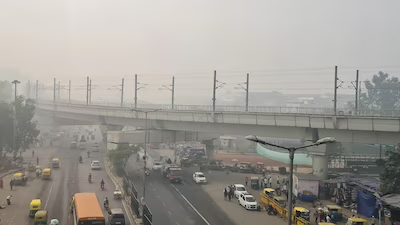New Delhi: Delhi’s air quality continues to be classified as ‘very poor,’ with the Air Quality Index (AQI) recorded at 332 as of 7 a.m. on November 29. This marks the sixth consecutive day of poor air quality, with some areas exceeding the ‘severe’ threshold of 400.
The air quality in other cities within the National Capital Region (NCR) has also worsened, with Greater Noida at 272, Ghaziabad at 258, Noida at 249, Gurugram at 258, and Faridabad at 166, indicating unhealthy pollution levels affecting millions in these regions.
According to the Central Pollution Control Board (CPCB), the AQI categories are as follows: 0-50 is ‘good,’ 51-100 is ‘satisfactory,’ 101-200 is ‘moderate,’ 201-300 is ‘poor,’ 301-400 is ‘very poor,’ 401-450 is ‘severe,’ and above 450 is ‘severe plus.’
Additionally, Delhi experienced its coldest night of the season on Thursday, with temperatures dropping to 10.1 degrees Celsius, as reported by the India Meteorological Department (IMD).
In response to the alarming pollution levels, the Supreme Court has mandated that all measures under the Graded Response Action Plan (GRAP)-IV, excluding those related to schools, remain in effect until the next hearing on December 2. The court stressed the importance of strict enforcement and noted shortcomings in the implementation of GRAP-4 guidelines, warning of potential action against responsible officials.
While allowing physical classes to continue, the court decided against relaxing restrictions under GRAP-3 or GRAP-2 until there is a consistent decline in AQI levels. It also instructed state governments to use the labour cess collected to assist construction workers affected by the ongoing construction ban.
To mitigate the pollution crisis, authorities have implemented several restrictions under GRAP-4, including a ban on the entry of non-essential trucks into Delhi, except those carrying essential goods or operating on cleaner fuels like LNG, CNG, BS-VI diesel, or electricity. Additionally, construction activities for public infrastructure projects have been halted to reduce dust pollution, a significant contributor to the current situation.
